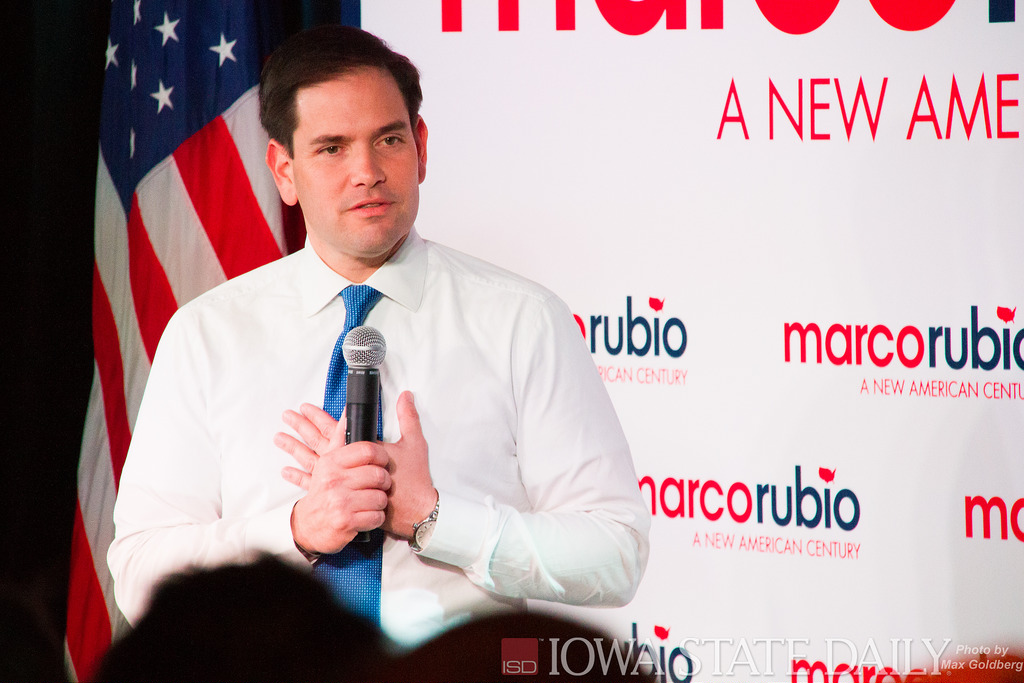It may seem strange to wonder if the man who’s been consistently polling at third-place in the race for the Republican presidential nomination actually wants the job but when you look at how Marco Rubio has been running his campaign, it’s a perfectly reasonable question.
As noted by the Boston Globe, Rubio’s strategy in the state of New Hampshire appears to be completely different from using scores of small-scale events with locals, the way that successful candidates in both parties have done for decades with a large staff spread across the state:
As Senator Marco Rubio has climbed the polls, the Floridian lacks one element that has proved to be pivotal for previous winners of New Hampshire’s presidential primary: a robust ground game that can generate enthusiasm and support when voters go to the polls. […]
GOP activists in New Hampshire are grumbling that Rubio has fewer staff members and endorsements than most of his main rivals and has made fewer campaign appearances in the state, where voters are accustomed to face-to-face contact with presidential contenders.
“For much of this year, Rubio just hasn’t been here,” said Belknap County Republican County chairman Alan Glassman, who is not backing a candidate.
Besides not hiring up in New Hampshire, Rubio is physically not showing up in the state much. According to the tracking site P2016, the Florida senator has been in the state for just 18 days since 2013. By way of comparison, New Jersey governor Chris Christie has stayed over for 57 days. The only currently running candidate who has spent less time in the Granite State is former surgeon Ben Carson, not exactly a role model in working hard to win the White House.
Rubio’s strategy for Iowa appears to be little different. According to P2016, Rubio has visited the Hawkeye State for just 28 days since 2013. Only two other candidates have stayed over less and neither Ohio governor John Kasich nor former Florida governor Jeb Bush is even pretending to win the GOP caucuses there. By contrast, Texas senator Ted Cruz has visited for 41 days.
The first-term senator’s seeming lack of interest in traveling to Iowa or New Hampshire is almost certainly due to a lack of funds as Daniel Larison notes:
Because Rubio hasn’t been able to raise much money, he hasn’t been able to build the sort of campaign organization that winning candidates typically have, but he also isn’t barnstorming the early states as long-shot candidates with few resources have to do in order to compete. He is taking his support for granted, and he doesn’t seem to be working very hard at winning over new supporters. If he were busily stumping all the time to make up for the lack of resources, he wouldn’t be accused of neglecting the early contests, but for whatever reason he isn’t doing that, either.
Instead of trying to grind out a victory by criss-crossing Iowa or New Hampshire the way that underfunded candidates like Rick Santorum managed to do in 2012, the Rubio campaign has explicitly said that it’s relying upon the media to carry the candidate’s message. That may seem ludicrous for a Republican to say, however, that actually appears to be the case as National Review reported as long ago as April.
Besides trying to get the senator booked on as many shows as possible (a desire he shares in common with Donald Trump and any other breathing politician), Rubio’s team appears to think that a $3 million television advertising buy in New Hampshire will be the ticket to victory, never mind that the political action committee supporting Jeb Bush just spent $18.5 million in the state and went from double digits to around 7 percent.
According to multiple reports, the Rubio campaign appears to believe that the state-by-state primaries and caucuses are merely proxies for national poll ratings. It’s a theory that’s completely inconsistent with the facts. There is something this theory is consistent with, however, and that is the campaign strategy of Rudy Giuliani in 2008.
As you may recall, the former New York mayor’s master plan didn’t quite work out as his hometown paper discussed in detail after the fact:
Mr. Giuliani finished third in the Florida primary on Tuesday night; only a few months earlier, he had talked about the state as his leaping-off point to winning the nomination.
As Mr. Giuliani ponders his political mortality, many advisers and political observers point to the hubris and strategic miscalculations that plagued his campaign. He allowed a tight coterie of New York aides, none with national political experience, to run much of his campaign.
He accumulated a fat war chest — he had $16.6 million on hand at the end of September, more than Mitt Romney ($9.5 million) or Senator John McCain ($3.2 million) — but spent vast sums on direct mail instead of building strong organizations on the ground in South Carolina and New Hampshire.
Giuliani’s idea of ignoring Iowa, New Hampshire, and South Carolina didn’t pan out but at least he was ahead in the polls in the state of Florida for some portion of the campaign. Literally at no point has Rubio led any other candidate in any state, even Florida. It’s almost like Rubio is trying a front-runner strategy while polling in third or fourth place.

